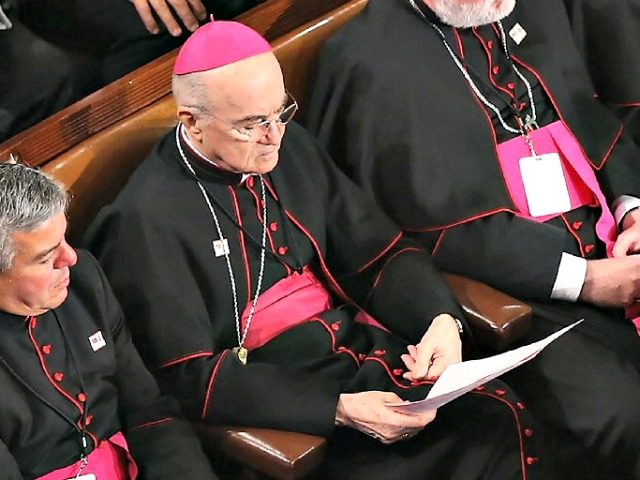The New York Times is joining other left-wing media in trashing the letter released by Archbishop Carlo Maria Viganò, the Vatican’s former ambassador to the United States, which links both the Catholic Church’s sexual abuse crisis, as well as ensuing coverups by bishops, to an extensive “homosexual network” within the Church.
“Most experts reject the conflation of homosexuality and pedophilia as a dangerous route to bigotry against gays,” the Times asserts.
Though Catholic officials, bishops, priests, and prominent Catholic women are finally, and forcefully, speaking out about, and demanding a halt to, sex abuse and cover-ups in the Church – the Times states their long-awaited openness and honesty is nothing more than traditional Catholics trying to bring down Francis’ papacy.
Viganò’s letter, says the Times, is “an ideologically motivated” movement that has “weaponized the church’s sex abuse crisis to threaten not only Francis’ agenda but his entire papacy.”
According to the newspaper, Pope Francis has finally moved the Church away from “culture war issues” such as “abortion or homosexuality.”
“’Who am I to judge?’ the pope famously said, when asked about gay priests,” the Times repeats the phrase uttered by Pope Francis that has been quoted time and again, including by politicians such as Nancy Pelosi and Tim Kaine – self-described Catholics who could easily apply the new pope’s words to gain cover for pro-abortion and pro-same-sex marriage views and policies.
“At the very least, [Viganò’s letter] has returned the issue of homosexuality in the Roman Catholic Church, which many conservatives are convinced lies behind the abuse crisis, to the center of debate,” the Times bemoans.
In his letter, Viganò charged that, as the papal nuncio to the United States, he personally informed the pope of former Cardinal Theodore McCarrick’s sexual abuse of priests, seminarians, and minors on June 23, 2013 – three months after Francis was elected pope by the College of Cardinals. The pope, nevertheless, “continued to cover for [McCarrick],” Viganò charged.
The former nuncio wrote that, despite being aware of McCarrick’s abusive history, Pope Francis “did not take into account the sanctions that Pope Benedict had imposed on [McCarrick] and made him his trusted counselor.”
Viganò has called upon Pope Francis to resign his office.
Perhaps this is nothing less than a stunning moment in the Church’s history, when even thousands of Catholic women, for example, have confronted Francis, demanding he give them answers – “now” – about his knowledge of the scandals involving McCarrick.
In a letter to the pontiff following his evasive response to reporters’ questions regarding the Viganò letter, these prominent Catholic women – among them seminary professors, theologians, evangelists, and psychologists – boldly asserted to Francis their challenge to him is based upon his own words regarding a desire for “a more incisive female presence in the Church.”
“Pope Francis, your words are inadequate,” the women take the pope to task. “[W]e expect you, Holy Father, to be honest with us.”
The Times refers to this battle as “open and brutal,” and states Viganò’s accusations against the pontiff “remain unsubstantiated.”
The newspaper is joined by other left-wing Catholic writers who are perhaps criticizing Viganò for outing what many have known but have been afraid to openly discuss.
The Jesuit editor of the progressive America magazine, Father James Martin, called the tumult that has followed Viganò’s letter a “witch hunt for gay priests,” even as he admits, “Many priest abusers had a homosexual orientation. That is undeniable.”
At National Catholic Reporter – an outlet known for its dissent from Catholic teaching – Michael Sean Winters refers to Viganò as a “trafficker in conspiracy theories.”
“Viganò is more than a little obsessed with homosexuality and names prelates whom he accuses of supporting efforts at ‘subverting Catholic doctrine on homosexuality,’” Winters writes, warning that a “putsch is afoot and if the U.S. bishops do not, as a body, stand up to defend the Holy Father … we shall be slipping towards schism … The enemies of Francis have declared war.”
Rod Dreher, senior editor at the American Conservative, however, says, among other things, the scandal “reveals … a core crisis in governance of the Catholic Church.”
He addresses critics of Pope Benedict who claim the retired pontiff ignored McCarrick’s continued public ministry after he imposed sanctions against him.
Dreher describes the gay network within the Church known as the “lavender mafia” as “lawless men.”
Men such as former Cardinal Roger Mahony of Los Angeles – who was barred from public ministry by his successor, Archbishop José Gomez, for his failure to protect young people from sexually abusive priests – are “still out and about,” Dreher observes.
“McCarrick’s public activities during which time he was supposed to be restricted from public ministry do not put the lie to the claim that Benedict restricted him,” he explains. “They may only testify to the fact that McCarrick was defiant.”
“Viganò said openly the kinds of things that Catholic conservatives have said privately for years,” Dreher writes. “He has told tales out of school.”
The writer urges all the prelates named by Viganò in his letter to “respond to his extremely serious charges.”
“When charges as explosive as these are leveled by a man who was in Viganò’s senior position within the Vatican apparatus, they cannot be ignored,” he said. “Silence speaks volumes.”

COMMENTS
Please let us know if you're having issues with commenting.